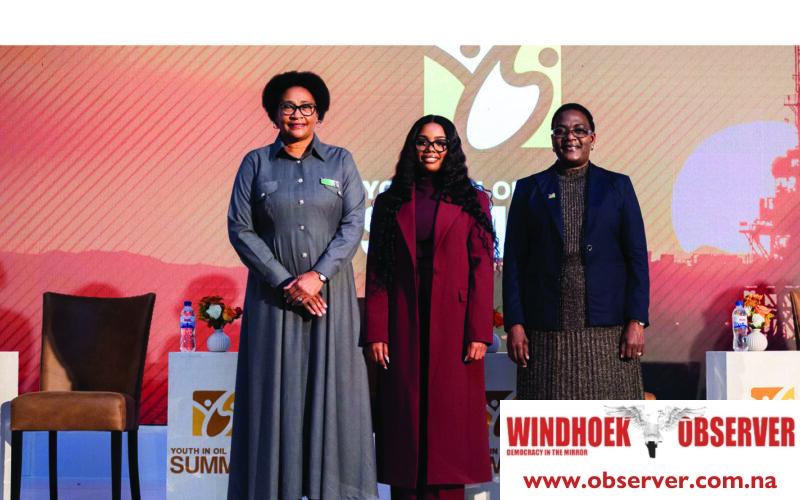Justicia Shipena
In the next five years, the government plans to increase carried participation from 10% to 15%. This goal is outlined in the recently launched sixth National Development Plan (NDP6), which sets 2030 as the deadline. The goal is to empower citizens and local corporations to actively participate in the petroleum sector.
The plan also includes goals to produce 150 million barrels of oil equivalent, increase gas production to 130 million standard cubic feet per day, and create 22,800 jobs by 2030.
Recent reports show that Namibia collected N$5.96 billion ($309 million) in royalties from mining activities over the last three years.
At the Youth in Oil and Gas Summit over the weekend, Kornelia Shilunga, special presidential advisor and head of the Upstream Petroleum Unit, pointed out that the current laws governing the sector are outdated. She explained that the regulations were designed when the sector’s potential was unclear, and now Namibia needs modern policies to support the industry’s growth.
The government has started preparing for the development of a Namibia Oil and Gas Logistics Supply Base, led by Namport’s N$4 billion expansion of the Lüderitz port.
Shilunga also announced that the Upstream Petroleum Unit is reviewing the existing regulatory framework to propose updated policies for better governance. “The sector offers opportunities across the full industry spectrum, from upstream exploration to downstream trading and refining,” she said. She urged industry stakeholders to invest in local capacity building and emphasised that this is a crucial time to ensure the industry’s benefits are felt across the entire economy.
Shilunga stressed the importance of youth involvement in the oil and gas sector. “The youth are not only the future of this industry, but they are also its present momentum.” Namibia’s first oil discoveries in the Orange Basin in 2022 have resulted in an estimated 11 billion barrels of oil and 2.2 trillion cubic feet of natural gas reserves. By 2024, 28 offshore oil and gas exploration wells and 15 appraisal wells had been drilled, along with 10 exploratory wells onshore.
Shilunga emphasised that Namibia’s growing energy sector must focus on environmental protection and social accountability. She challenged the industry, academia, and the government to collaborate on accelerating youth-focused reforms and policies. “I challenge industry players to invest in capacity building. I challenge academia to align curricula with current and future energy needs. And I challenge the government to accelerate youth-focused reforms and policies,” she said.
At the same event, Erongo governor Natalia |Goagoses called for greater youth inclusion in the sector. She stressed the need for investment in vocational training, mentorship, and hands-on experience to equip young people with the skills to succeed. “Local content must include youth content,” she said, urging stronger regulations that ensure exploration and production activities involve measurable commitments to youth employment, training, and enterprise development.
In 2022, the Cabinet approved a National Upstream Local Content Policy to boost local oil and gas sector participation.
|Goagoses expressed support for reviewing the Petroleum Act and related legislation to reflect the national priority of youth empowerment.
Justina Erastus, founder of the Youth in Oil and Gas Summit, encouraged young people to seize the opportunities in Namibia’s oil and gas sector. “I see a future where Namibia is 100% electrified thanks to our own oil and gas resources,” Erastus said.
She envisions Namibia becoming a leading oil producer, fueling industrial growth and regional integration. “Oil and gas is a long interconnected value chain that calls for logistics experts, caterers, waste managers, asset custodians, communicators, and creatives,” Erastus added.
Erastus emphasised the importance of creating a prosperous and safe future for Namibia and its future generations.
At the same time, YIOGS announced a strategic partnership with the Petroleum Training and Education Fund (Petrofund) for the third edition of the summit in July 2026.
The chief executive officer of Petrofund, Nillian Mulemi, highlighted the need for collaboration across government, industry, and education to ensure that Namibia’s oil and gas development leads to meaningful economic growth.
“As the country enters a new energy era, partnerships will be essential to ensure the benefits of oil and gas development are fully realised,” Mulemi said.
The summit took place under the theme “Drilling into the Future: Empowering Youth in Namibia’s Oil & Gas Revolution,” in Walvis Bay.
The summit brought together over 400 delegates, including university students, high school learners, industry professionals, government officials, local service providers, and both local and international guests.




